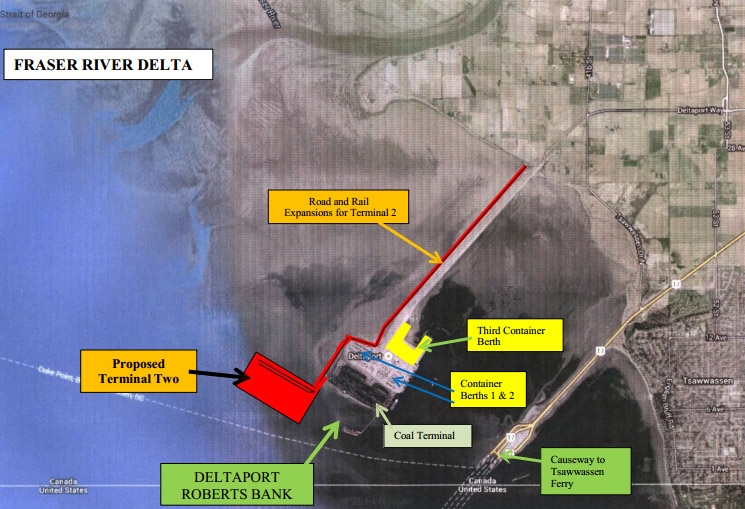Terminal 2 Expansion
The Vancouver Fraser Port Authority is continuing its pursuit of adding a second container terminal on Roberts Bank (RBT2). Federal and BC Governments approved RBT2 over massive opposition ignoring science facts and evidence.
Scheduled for completion in the early 2030s, building RBT2 means three times the number of container trucks, three times the level of air pollution, three times the number of trains, and three times the incidents of air and light pollution as well as noise pollution from port operations (shunting) and train movements.
The footprint of the RBT2 man made island, to be built in Georgia Strait, is 177 hectares, over one third the size of Vancouver's Stanley Park. In totality the T2 development will destroy over 1000 hectares of Fraser Estuary habitats of "endangered" orca whales and salmon. It is also likely to destroy critical feeding grounds for migratory and other shorebirds that rely on Roberts Bank.This damage cannot be mitigated.
Map_showing_proposed_Terminal_2_location.pdf
- TERMINAL 2 IS NOT SUSTAINABLE
Port_Metro_Vancouver_T2_Development_Is_Not_Sustainable_Nov_2015__0.pdf
- NO BUSINESS CASE FOR T2 No_Business_Case_for_T2__June_2__2014_0.pdf
- NO JUSTIFICATION FOR T2 (Report by Roger Emsley)
- Write to the Politicans and tell them there is no business justification for this project
- Letter_Opposing_Roberts_Bank_Container_Terminal_2.pdf
The infrastructure required to service Terminal 2 includes the South Fraser Perimeter Road (SFPR), Highway 17; an intermodal rail yard; additional railway tracks; and container storage facilities. Not only will these projects industrialize over 1000 acres of prime agricultural land, they'll also require the expenditure of millions of taxpayers' dollars. Some of this infrastructure has already been built on lands behind the existing Deltaport. It includes warehouses, a logistics centre and a Border Services container inspection facility. However that does not mean RBT2 should be built.
The cumulative effects of Terminal 2 should have been assessed with Deltaport's Third Berth Project, as required by the Canadian Environmental Assessment Act. In fact, the SFPR, the Tsawwassen First Nation's warehouses and container storage facility, the intermodal rail yard and the additional rail track in the Port Subdivision should all be part of a full cumulative impact assessment. However despite numerous requests the Federal Government is refusing to do so.
This piecemeal approach utilized by the provincial and federal governments and their agencies is an outrageous attempt to bypass environmental protection measures and proper public input.
RBT2 must be stopped before construction starts, to avoid another democratic travesty like Deltaport Third Berth which, after a flawed and incomplete environmental assessment left many issues unaddressed. Furthermore the habitat replacement for this project failed in numerous areas.
It can be stopped. Write to companies that might bid to operate RBT2. These include:
Abu Dhabi Terminals
Ole Pugholm, CFO ole.pugholm@adterminals.ae
GrupTCB/Mitsubishi Corp Consortium
Jack Craig, President & CEO, APM Terminals North America Inc.
jack.michael.craig@apmterminals.com
Ports America
Michael F. Hassing, CEO
michael.f.hassing@portsamerica.com
International Container Terminal Services Inc. (ICTSI)
Manila, Philippines
PSA International
Tan Chong Meng, Group CEO
cmtan@psa.com.sg
Terminal Link/CMHI Consortium
Farid Salem, Executive Officer, CMA-CGM
ho.ftsalem@cma-cgm.com
TiL Terminal Investment Limited
Subsidiary of MSC
Ammar Kanaan Chief Executive Officer
Geneva, Switzerland
APM Terminals – subsidiary of A.P. Moller Maersk
Keith Svendsen Chief Executive Officer
APM Terminals Management B.V
Turfmarkt 107 (5th Floor)
2511 DP The Hague
The Netherlands
PSA International PTE Ltd
Tan Chong Meng CEO of PSA International
Singapore
1 Harbour Drive, PSA Horizons, Singapore 117352
Hutchison Port Holdings
Subsidiary of Hong Kong Based CK Hutchison Holdings
ERIC IP
Group Managing Director Hutchison Ports
Evergreen Marine Corporation (EMC)
Taoyuan City, Taiwan
Carrix
Uffe Ostergaard CEO
Seattle WA USAWashington, United States
copy saynotot2@gmail.com




